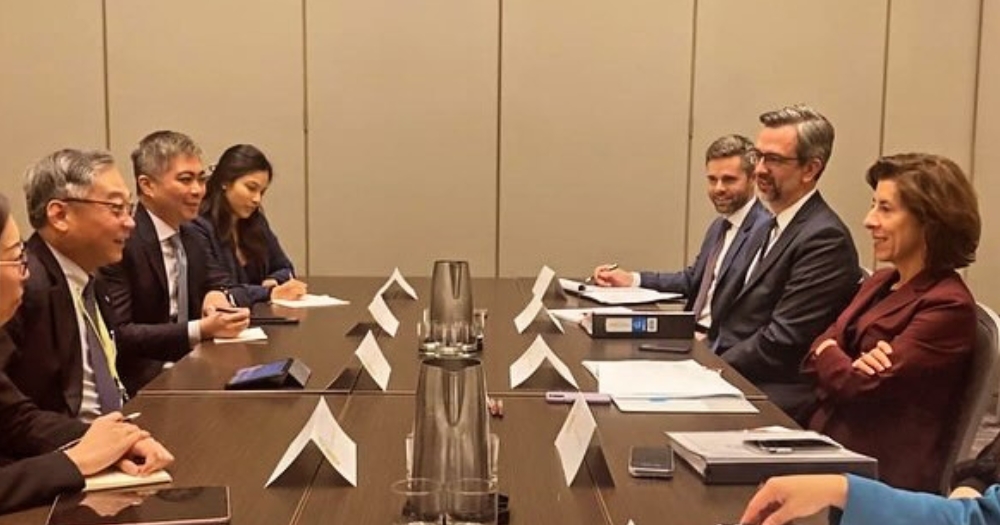On April 29, Minister for Trade & Industry Gan Kim Yong spoke at the U.S. Singapore Free Trade Agreement's 20th anniversary business reception in Washington, DC., as part of a six-day working trip to the United States and Canada.
Partnership for Growth and Innovation
Earlier in the day, he had met with the U.S. Secretary of Commerce, Gina Raimondo, where they reaffirmed their commitment to advancing bilateral cooperation under the U.S. Singapore Partnership for Growth and Innovation.
They also discussed potential for collaboration to enhance semiconductor supply chain resilience, help SMEs to participate in the digital economy, as well as explore further cooperation in new areas of mutual interest.
They welcomed the good progress in the Indo-Pacific Economic Framework for Prosperity (IPEF), as well as preparations for the signing of the Clean Economy and Fair Economy agreements.
The two agreements, part of the Biden administration's attempt to set up a framework with Asian allies to tackle economic challenges in the Indo-Pacific region.
The Clean Economy and Fair Economy agreements were attempts within the framework to enhance collaboration on initiatives such as green technologies and tackling corruption.
USSFTA 20th Anniversary
Gan gave the keynote address in an anniversary dinner to commemorate the 20th Anniversary of the USSFTA, saying that for the past 20 years it has been a pathfinder for the bilateral trade and investment relationship.
He said that he hoped in the next 20 years and beyond, the U.S. and Singapore could serve as pathfinders to accelerate the adoption of emerging technology.
U.S.-Singapore collaboration could be a “model and a bridge for other countries, in order to maximise our efforts in technology and innovation”.
Gan described the USSFTA as a bridge that was built at the right place at the right time.
It was the first free trade agreement that the U.S. signed with an Asia-Pacific country, and remains the US's only FTA with an Asean country.
Since the signing of the USSFTA in 2005, bilateral trade had almost tripled, with the U.S. having a nearly S$54.5 billion trade surplus with Singapore.
The U.S. was Singapore’s second largest trading partner, and the Singapore was the U.S.’s 17th largest.
Singapore received the most U.S. investment in the Indo-Pacific, placing it seventh highest in the world and was larger than in China, Japan, and Korea combined, with almost 6,000 American companies currently in Singapore.
Singapore's investment in the U.S. was also significant, and was the third largest Asian investor in the United States, with over 200 Singaporean companies in 40 different states.
There were an estimated 250,000 jobs in the U.S. that were estimated to be supported by the bilateral trade relationship.
“We hope that greater trading investment between the U.S. and Singapore will help generate more good jobs in both countries.”
Gan said that the success of the USSFTA demonstrated the benefits of an open, inclusive and rules-based multilateral trading order:
"This has underpinned our economic and commercial relationship for the past 20 years."
Safe and secure regional hub
Singapore intended to continue to serve as a safe and secure regional hub for U.S. businesses, and strong partnerships between the two governments and the business community was integral to Singapore’s economic development.
One example he gave was Singapore's over S$1 billion investment in Artificial Intelligence, both in infrastructure and talent development.
This was intended to enhance an AI ecosystem in Singapore that already provided a best-in-class compute infrastructure, access to Southeast Asia, as well as a diverse and capable talent pool.
The Singapore government intended to continue to serve as a digital economy hub, by providing clear rules to deal with risks such as data privacy and cellular security, a collaborative approach to encourage the responsible use of emerging technologies, and an unwavering commitment to the free and open internet and cross-border data flows, through its network of digital economy agreements.
Singapore knows that these are essential to remain a responsible and trusted partner on AI, a premium in AI development, and core to Singapore’s value proposition as an AI hub for the world.
Top image from Gan Kim Yong/Facebook

If you like what you read, follow us on Facebook, Instagram, Twitter and Telegram to get the latest updates.



